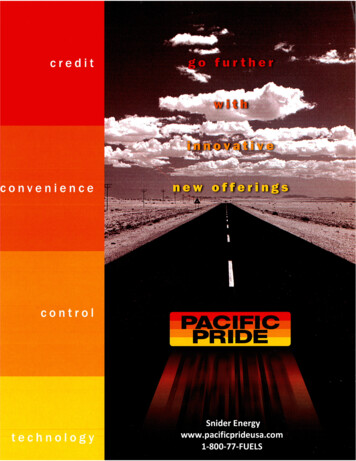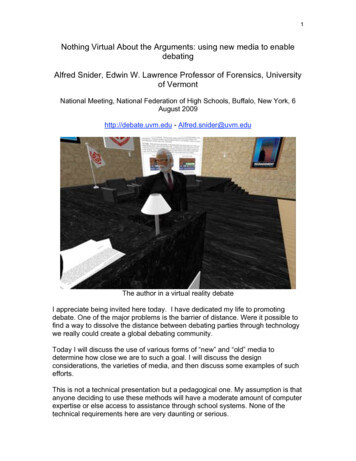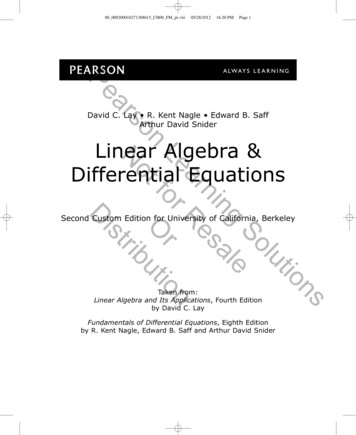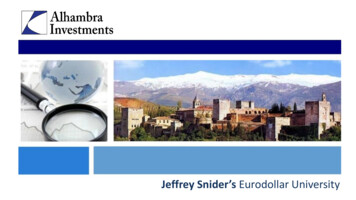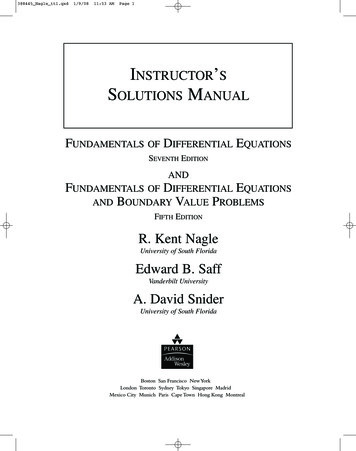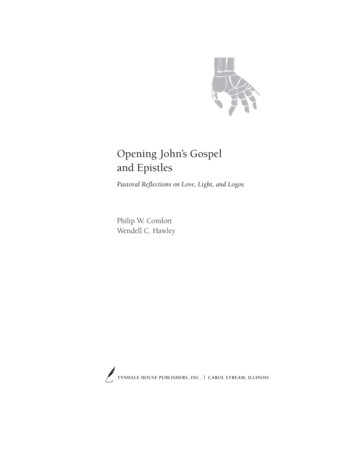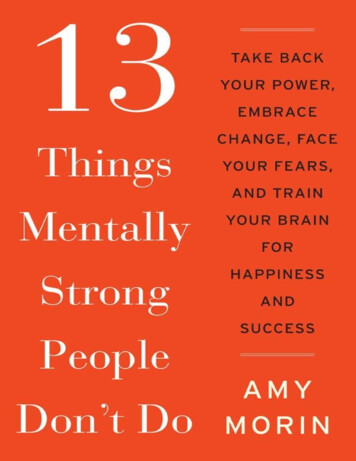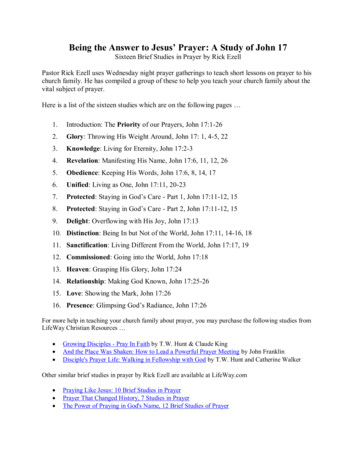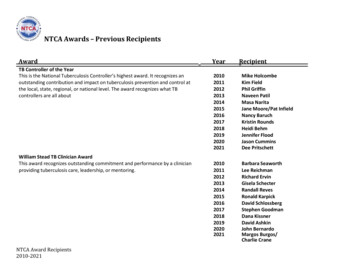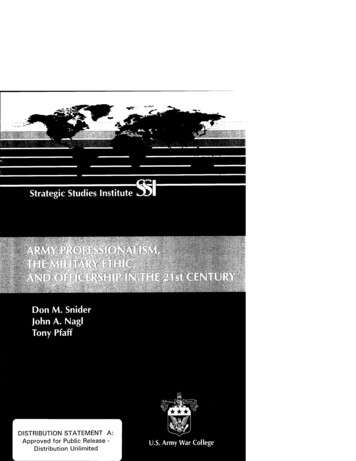
Transcription
Don M. SniderJohn A. NaglTony Pfaff &Tntsuixifftii?j vT ' 'vt'T-lilftfi»!DISTRIBUTION STATEMENT A:Approved for Public Release Distribution Unlimited Hl&iftSu.sArmy War College
STRATEGICSTUDIESINSTITUTEThe Strategic Studies Institute (SSI), co-located with the U.S. ArmyWar College, is the strategic level study agent for the Deputy Chiefof Staff for Operations and Plans, Department of the Army.The mission of SSI is to use independent analysis to conductstrategic studies that develop policy recommendations on: Strategy, planning and policy for joint and combinedemployment of military forces; The nature of land warfare; Matters affecting the Army's future; The concepts, philosophy, and theory of strategy; and Other issues of importance to the leadership of the Army.Studies produced by civilian and assigned military analysts deal withtopics having strategic implications for the Army, the Department ofDefense, and the larger National Security community.In addition to its studies, SSI publishes special reports on topics ofspecial or immediate interest. These include but are not limited toedited proceedings of conferences and topically-orientatedroundtables, expanded trip reports, and quick reaction responses torequirements of the Office of the Secretary of the Army, the Officeof the Secretary of Defense, and the National Security Council.The Institute provides a valuable analytical capability within theArmy to address strategic and other issues in support of Armyparticipation in national security policy formulation.
ARMY PROFESSIONALISM,THE MILITARY ETHIC,AND OFFICERSHIP IN THE 21st CENTURYDr. Don M. SniderMajor John A. NaglMajor Tony Pfafft QWnilKMBDlDecember 199920000121 015
The views expressed in this report are those of the authors and donot necessarily reflect the official policy or position of the U.S. MilitaryAcademy, the U. S. Army War College, the Department of the Army, theDepartment of Defense, or the U.S. Government. This report is clearedfor public release; distribution is unlimited.Comments pertaining to this report are invited and should beforwarded to: Director, Strategic Studies Institute, U.S. Army WarCollege, 122 Forbes Ave., Carlisle, PA 17013-5244. Copies of this reportmay be obtained from the Publications and Production Office by callingcommercial (717) 245-4133, FAX (717) 245-3820, or via the Internet atrummelr@awc.carlisle.army.milMost 1993, 1994, and all later Strategic Studies Institute (SSI)monographs are available on the SSI Homepage for electronicdissemination. SSI's Homepage address is: http://carlisle-www.army.mil/usassi/welcome.htmThe Strategic Studies Institute publishes a monthly e-mailnewsletter to update the national security community on the research ofour analysts, recent and forthcoming publications, and upcomingconferences sponsored by the Institute. Each newsletter also provides astrategic commentary by one of our research analysts. If you areinterested in receiving this newsletter, please let us know by e-mail atoutreach@awc.carlisle.army.mil or by calling (717) 245-3133.ISBN 1-58487-011-7li
FOREWORDIn the following monograph, Dr. Don M. Snider, a retiredArmy colonel and Professor of Political Science at West Point,Major John Nagl of the Department of Social Sciences, and MajorTony Pfaff of the Department of English and Philosophy, addresswhat they—and many others—perceive to be a decline in militaryprofessionalism in the Army officer corps. The authors firstdescribe the ethical, technical, and political components ofmilitary professionalism and then address the causes for thedecline. They conclude by proposing a set of principles which, ifadhered to, will reinvigorate the vision of the officer corps andmotivate the corps to selfless service.Dr. Snider, and others who served in the Army in the laterstages of the Vietnam War, saw firsthand the deleterious effectsthat result when an institution loses or discards its moral andethical compass. One of the hallmarks of a great institution,however, is its ability to recognize and deal with its defects. TheArmy did that during the decades that followed the Vietnam War.The officers and soldiers of America's Army rebuilt theirinstitution into the world's finest army; the force of decision inOperation DESERT STORM. In the last few years, rapiddownsizing and vastly increased operational tempo have had anegative impact on the Army and the officer corps. BecauseGeneral Eric Shinseki understands what is at stake, our Chiefhas challenged each of us to help him reinvigorate America'sArmy. Accordingly, we commend this thought-provoking essay asa step in that direction.LOVELACE, JlInterim DirectorStrategic Studies InstituteDOUGLKSC.111
CENTER FOR THE PROFESSIONAL MILITARY ETHICThe United States Military Academy activated the Center for theProfessional Military Ethic (CPME) in August 1998 to bring a newcohesiveness to the United States Military Academy's moral-ethicaltraining of cadets. While the cadet honor code (which states that "Acadet shall not lie, cheat or steal or tolerate those who do") and the motto("Duty-Honor-Country") provide the underpinnings of cadets' moralethos, Academy leadership established the Center to deepen cadets'understanding of the Professional Military Ethic and to develop withineach cadet a self concept of officership. The Center will also coordinateand integrate the Academy's officership development programs acrossthe curriculum. In turn, as the Center matures, it will provide enhancedassessment methods and resources to Academy leadership, as well asassistance to the field Army, other training centers and civilianeducation institutions with ethical development issues, training forvolunteer instructors and ethical development opportunities for cadets.Specifically the center will perform five functions: (1) Develop andmaintain instructional materials in support of a program of instructionto the Corps of Cadets on the Professional Military Ethic; (2) Assess theeffectiveness of the "West Point Experience" in developing within cadetsa professional self-concept and an understanding of the ProfessionalMilitary Ethic; (3) Conduct research on the Professional Military Ethicto determine its current content, the potential requirements for change,and its application to the education of cadets and ultimately to theArmy; (4) Develop outreach initiatives to assist and interface with theArmy, particularly schools of professional military education, and otherappropriate Federal and civilian institutions on the subject ofprofessional ethics and ethical education relating to the Profession ofArms and scholastic integrity; (5) Supervise the Cadet Honor andRespect Committees.This paper, jointly sponsored by SSI and CPME, is intended to bethe first of many whose purpose is to promote scholarship on Officershipand the Professional Military Ethic as well as enhance the discussion ofmilitary professionalism within the Army and sister services.Michael E. HaithColonel, InfantryDirector, CPMEIV
BIOGRAPHICAL SKETCHESOF THE AUTHORSDR. DON M. SNIDER is Professor of Political Science,teaching seminars in military innovation/adaptation andcivil-military relations in the Department of Social Sciencesat West Point. He has been a member of the civilian facultyof the U.S. Military Academy since 1998, having previouslyheld the Olin Chair in National Security Studies,1995-1998. Earlier, he completed a military career whichincluded three combat tours in the Republic of Vietnam and,much later, service on the staff of the National SecurityCouncil, The White House. He retired from the Office of theChairman, Joint Chiefs of Staff, in 1990. Dr. Snider'scurrent research and publications focus on military cultureand ethics, the gap between the military and Americansociety, officership, and U.S. security policy towardsEurope.MAJOR JOHN A. NAGL teaches international relationsand national security studies in the Department of SocialSciences at West Point. A West Point graduate, he holdsMasters and Doctoral degrees in International Relationsfrom Oxford University, where he studied as a RhodesScholar. His doctoral dissertation, "Learning to Eat Soupwith a Knife," examined how military organizations adaptto unfamiliar situations. An armor officer, he led a tankplatoon of the First Cavalry Division during OperationDESERT STORM and commanded an armored cavalrytroop in the First Armored Division in Germany. MajorNagl's recent publications include works on arms controlpolicy and military innovation.MAJOR TONY PFAFF teaches in the Department ofEnglish and Philosophy at West Point. He received a BA inEconomics and Philosophy from Washington and LeeUniversity and an MA in Philosophy from StanfordUniversity, where he was also a graduate fellow at thev
Stanford Center for Conflict and Negotiation. An Infantryofficer, he served in the 1/505 PIR, 82d Airborne from 1987to 1991 with which he deployed to the Persian Gulf. He hasalso served in the First Armored Division from 1992-1995,holding several brigade and battalion level positionsincluding Company Commander and Battalion S3. Duringthat time he also deployed to Macedonia for OperationABLE SENTRY. Major Pfaff has written and presentedseveral papers on a variety of topics including militaryethics, ethics of development and conflict resolution.VI
ARMY PROFESSIONALISM,THE MILITARY ETHIC, ANDOFFICERSHIP IN THE 21st CENTURYIntroduction: Army Professionalism and Conflictwithin the Professional Military Ethos.On January 25, 1999, a tall, ramrod-straight youngcombat-arms officer serving in Bosnia with the 1st ArmoredDivision told the about-to-graduate cadets at West Point, "Itell my men every day there is nothing there worth one ofthem dying for." It was a startling admission to the cadetswho were in the midst of a series of classes on theprofessional military ethic; the lieutenant's admission wasutterly contradictory to what they had been studying. Theirstudies had led them to believe that minimizing casualtieswas an inherent part of every combat mission but not amission in and of itself, particularly one which mightimpede or even preclude success in the unit's mission —inthis case, peace operations within the American sector ofBosnia. Queried by a cadet in the audience as to why hecommunicated this to his men, the lieutenant responded,"Because minimizing, really prohibiting, casualties is thetop-priority mission I have been given by my battalioncommander."Some time later in the presentation the battalioncommander gave his perspective. "It's simple," he said."When I received my written mission from Division,absolutely minimizing casualties was the missionprioritized as first, so I in turn passed it on in my writtenoperations order to my company commanders. This is themission we have, this is the environment in which wework."2Some months later an article in Army magazine by anArmy major made the same point. Arriving for duty inBosnia, his brigade commander gave the major the
following guidance, "If mission and force protection are inconflict, then we don't do the mission."3To us, these two examples from the many communicatedeach week within the media and among the e-mail of theArmy officer corps demonstrate that the Army's norms ofprofessional behavior are being corroded by politicalguidance on force protection. Doubtless the ethics of otherservices are being corroded by the same guidance—witnessAir Force pilots flying combat missions from fifteenthousand feet in Kosovo and Bosnia to avoid the risk of pilotloss from ground fire and missiles. Yet one does not hearsenior military leaders defending the military ethic,informing the profession and the American public it servesof its utter necessity for military effectiveness. Neither doesone read in military journals significant dialogues on thepersonal conflicts this is causing for individual officers.Placed in the larger context and stated simply, changesin the international system since the end of the Cold War,the new nature of conflict (which we will refer to simply asmilitary operations other than war, MOOTW) and secularchanges within American society are strongly influencingthe American military ethic in directions unknown. This isan issue of military professionalism, rightly understood;and as such in an era of already declining Armyprofessionalism is of vital concern to both professionals andthe society they serve.Thus this manuscript will proceed to place this issue intothe context of military professionalism, a topic little studiedin the military now and even less understood outside theprofession. Subsequently, we will use that framework toanalyze two issues within the profession now impedinghealthy adaptations—the officer corps' intellectual muddleover the purpose of the Army and their ethical muddle overthe role of self-sacrifice in the profession's ethos. We believethese two unresolved contradictions have contributed invery significant ways to the Army's inability thus far to dealeffectively with vexing issues such as force protection.
Lastly, we will present a "principled approach" for arenewed self-concept and motivation of the Army officercorps, a self-concept that, if it existed now, would lend a verydifferent perspective to such issues as force protection.A Framework for Analysis:Military Professionalism.Our understanding of military professionalism isadapted from Professor Sam. C. Sarkesian.4 As he noted in1981, "the examination of professionalism, its boundaries,and substantive elements lack a generally accepted andcoherent perspective."5 Fortunately, Professor Sarkesianoutlined such a framework in his book, but to our knowledgeit has not been seen in the literature since. It is a frameworkthat in the more quantitative analytical environment todaywould be considered a 3x3 matrix of political, social andfunctional interactions inherent in the relationshipsbetween a democratic society and its Army—its militaryservants. In matrix form it appears as:ComponentsLevelof AnalysisMilitaryTechnicalSocietyLand mine ban,MOOTWmissionsPost-modern oregoist utionRMA,resources,recruiting, anddecliningprofessionalismTheProfessionalMilitary Ethicand forceprotectionPowell Doctrineand forceprotectionIndividualskills, re 1. American Military Professionalism.
Further, each of these components can be analyzed fromat least three different levels. They can be viewed at thelevel of, or from the perspective of, the American societysanctioning the military institution, the military institutionitself (the Army), or from the perspective of the individualsoldier within the institution. In contrast to the verticallines above, the horizontal lines in the diagram representreal boundaries across which deep and abidingrelationships have been created, both official (formal) andunofficial (informal). These relationships and some of thecontemporary issues creating tensions, both healthy anddysfunctional, will be delineated briefly in the sections thatfollow in order to show their contextual reality among themany interactions and relationships involved. Takentogether they provide a brief overview of the state of themilitary institution, its professionalism or effectiveness,and its relationship with the society it serves.The Functional or Military-Technical Component. Thiscomponent includes those aspects of the profession that giveit unique purpose and legitimacy, what Huntington calledthe "expertise" of the profession.6 He defined this function inthe post-World War II era as the "management of violence."Others have at different times given it different titles, butthe essence remains clear regardless of specific purposestatement: Armies have been created by societies throughthe ages for the purpose of protecting themselves, theirterritory and their way of life, and for advancing theirnational interests in the regions around them. During thealmost four centuries since the Treaty of Westphalia andthe appearance of the nation-state, the formativerelationships between societies and their armies havevaried dramatically depending on the society, its ideologyand its form of government, i.e., the state.7 Now in thepost-Cold War era, it may be the case that once again theformative relationships have changed, at least among theadvanced democratic nations, reserving armies forprimarily defensive purposes.8 Such formativerelationships include the purpose for which society seeks to
prepare and use its army and the resources provided forsuch uses, particularly human resources—by conscriptionof a mass citizen army, by soliciting/enticing volunteersfrom among the citizenry as the United States does today, orby some combination of these methods.At the societal level, one currently contentious issue (asnoted in Figure 1) is the desire of some American politicalleaders and a considerable portion of the public to outlaw byinternational treaty the use of land mines as a form ofwarfare. Such intrusions into the traditional sphere ofmilitary professionals—how best to fight wars—is oneindicator of society's dissatisfaction with currentprofessionalism. Thus the darker horizontal line separatingthe societal level of analysis from the institutional levelconnotes an American civil-military relationship currentlywith significant tensions on many issues across all threecomponents of professionalism, land mines being only one.At the institutional level, the military-technicalcomponent focuses on the overall effectiveness of the Army.Is it capable of doing what society expects of it and in themanner it is expected? Such military effectiveness is theresult of many things, some under the control of the leadersof the military institution and others that must be providedby a supporting society.10 Internally, the U.S. Army todayconsiders these essential inputs to combat effectiveness tobe the "six imperatives": force mix, doctrine, training,modern equipment, leader development, and qualitypeople.11At this level of analysis, there are myriad issuescurrently demanding the urgent attention of the officercorps, those who are responsible for creating the intellectualconsensus and direction that sets the professionalstandards which produce military effectiveness, andsubsequently for policing and adapting these standards asnecessary. Such issues include the institution's inability toobtain a level of resources sufficient to the institution'sneeds, the demonstrable decline in military effectiveness of
front-line operational units,12 and the urgent, but unmet,need to modernize fighting forces for the informationdominant forms of warfare potentially available in the"revolution in military affairs (RMA)."13 These issues, all ofmajor significance for the decline in Army professionalism,have existed roughly in current form since shortly after theend of the Gulf War in 1992.At the third level of analysis, that of the individualsoldier, professionalism in the functional componentbecomes the issue of individual competence in soldier skillsand the motivation by which those skills are to be used andintegrated with those of other soldiers, whether they beofficer, noncommissioned officer or enlisted soldier. Giventhe virtual revolution that occurred in Army trainingprograms in the 1980s, resulting in the remarkableproficiency of our forces in the Gulf War, it might besupposed that at this level few problems exist. But that isclearly not the case. Since the Gulf War, the seriousmismatch between a military structure too large andresources too small, when combined with an unusually highoperational tempo for MOOTW, has severely eroded thetrust and commitment of individual officers and soldierstoward both the Army and the society it serves. This hasbeen particularly so when the soldier's quality of life iscontrasted to a roaring American economy with an excess ofgood job opportunities. Thus at the individual leveldeclining professionalism is reflected in the systemicinstitutional failure to attract and retain sufficient recruitsfrom the citizenry to man the current Army force structure,along with the continuing exodus of company grade officers,particularly from the combat arms.14The Ethical Component. The ethical component seeks ateach level of analysis to answer questions like "what shouldofficers and soldiers do?" and "what kind of leaders shouldthe Army have?" The answers to these questions establishnorms of individual and collective behavior, what courses ofaction, and what outcomes the officer is obligated to seek; insum, they constitute a professional military ethic. We
accept the definition of "ethic" as "the body of moralprinciples or values governing a particular culture orgroup."15 Just as with the military-technical component,this component can be analyzed from the perspectives ofAmerican society, the military institution, or the individualsoldier.At the societal level, it is difficult to categorize succinctlythe ethics to which Americans adhere. Americans are aneclectic people who embrace a variety of ethical beliefs;however, recently some have accumulated more weight asthose in influence have embraced them. These trends, oftenlabeled inaccurately as "post-modernism," reflect arejection by many Americans of traditional moralstandards. While some skepticism regarding tradition andauthority is healthy, completely rejecting traditionalstandards undermines the possibility of a common nationalor societal ethic on which professional organizations canrely to inform their own ethics. What many call "postmodernism" is best thought of as a complex collection ofbeliefs and theories that, in essence, reject the idea thatthere is any such thing as objective truth, ethical orotherwise. Without an objective standard, "truth" is thenleft to the individual or group to decide and thus becomesrelative to their desires and beliefs. This has underminedthe earlier consensus among Americans that any particularbelief can actually be wrong.Of course, not all Americans embrace such relativism,but often what arises in its place is an unreflective egoism,which is best characterized as the belief that what ismorally good is "what is best for me." Rather than therelative standard that post modernism offers, egoism is anobjective standard against which to measure conduct. Itsbasic premise is everyone should do those things, and onlythose things, that they perceive are good for them. Such anethic does not necessitate untrustworthiness, cowardice, orselfishness, and, in fact, many Americans have found that itis in their interests to be trustworthy, brave, and giving, andoften so behave. Nonetheless, such an ethic does not
preclude behavior such as untrustworthiness, cowardice, orselfishness by describing it as morally reprehensible—andwhen it does not, this ethic comes into direct conflict withthe professional military ethic.Many Americans have combined this egoist ethic withthe post-modern insight that all truth is relative, and relyon the contradictory ethical system that results from thisviewpoint to make ethical decisions. We cannot recount thenumber of students we have had who profess a belief inChristianity, Judaism, or Islam but reject the possibility ofobjective moral truth. This experience on campuses hasbeen noted and written about by other philosophers.16 Thefact that the acceptability of such contradictory beliefs hasseeped so profusely through modern religious institutions isalarming evidence that reason is slowly being disregardedas important in the larger society. And to a militaryinstitution that values, and indeed prizes, rational thoughtand decisionmaking processes, the potential conflict isimmense. Just as our students see no problem embracingthe contradictory beliefs of an objective religion along withrelative "post-modernism," so too many officers today seenothing wrong with embracing a personal ethic ofunreflective self-interest or relativism, along with theobjective ethical demands of the profession.At the level of the military institution, this contradictionis most evident as officers attempt to reconcile theirpersonal ethic with that of the institution. While the beliefsof egoism and post-modern relativism can be heldconsistently by many in America, they cannot be held byArmy officers who simultaneously hold an objectiveprofessional ethic.17 One reason is that while theprofessional military ethic requires that at least sometruths be held as objective, the social ethic does not. Anotheris that while the professional military ethic requires thatthe officer put self-interest secondary to at least some otherconsiderations, the prevailing social ethic does not. This isnot a new dilemma for the Army: Since the founding of theRepublic with its unique social contract making the8
citizenry sovereign over the state, the Army has understoodand accepted that it, ironically, can never reflect internallythe essence of this contract.18Furthermore, the ethical obligations of the officer areobjective and are not contingent on any desire held by anyindividual. The professional military ethic is not a relativeethic. The obligation to uphold it or any of its tenets does notarise because those in the profession said so, but ratherbecause it is necessary if the profession is to be effective inits purpose of warfighting. In a relativist ethic what is goodor bad is justified based on the desires of the individual orgroup; what is good is what makes one (or the group) feelgood, while what is bad is what does not. For a professionalethic, good and bad are determined, in part functionally, byhow the profession contributes to society. As noted earlier,the military performs a socially useful, indeed vitalfunction—the protection of society and its territory and wayof life. This creates a moral obligation for the soldier, andparticularly for the commissioned officer, to respondeffectively when called on to defend a defenseless society,even to the point of death.19Thus, where it would be improper for a manager at IBMto invade the privacy of her employees, the officer is morallyobligated to do so. In order for the military to function well,leaders must know and have influence over many aspects ofsoldiers' private lives, including their health and physicalcondition, how they spend their money, and where and withwhom they spend their free time.20 This does not mean,however, that Tightness or wrongness of exercising suchinfluence is relative to the situation, or even relative to thedesires of the officer corps or business professionals. Itmeans that given how the officer and the businessmancontribute to the well-being of society, in every case it wouldbe wrong for the IBM manager to exercise such influenceand right for the military officer to do so.The objectivity of the professional military ethic is alsonot contingent on any personal desire a member of the
profession might have. These obligations are not merelyinstrumental—they do not take the form "If I want to be asoldier, then I must be willing to sacrifice." Rather they takethe form "Since I am a soldier, I must be willing to sacrifice."The source of these truths arise out of the moral obligationan officer incurs when he or she accepts a public trust, i.e.,when an officer accepts freely, without reservation, his orher Commission from society. The obligations may beprofession specific—that is they only hold for those whoaccept the Commission—but they are nonetheless objectivein nature. They hold regardless of the desires or beliefs ofthose who accept such charges.Given this understanding of the nature of theprofessional military ethic, at the individual level theproblem is not just that the contradictions discussed earliermay cause soldiers to mistakenly choose one ethic over theother. Nor is the problem that soldiers may sometimes giveweight to the social ethic when they should have givenweight to the professional ethic though on occasion this toocan be a problem, witness the Aberdeen scandal or theegregious behavior of BG Hale.21The fundamental problem is the existence of thecontradiction itself. Logically, anything can follow from acontradiction. And if literally anything follows from acontradiction, then any system of beliefs that iscontradictory can produce any other belief. Ethical beliefsystems are supposed to guide our behavior. But if anythingfollows from a contradiction then anything could be anethical truth and thus any belief can pass as ethicalguidance. And if any belief can pass as ethical guidance,then ethics would not be able to guide decisions eitherindividually or organizationally—any decision would bejust as good as another! This renders such an ethical systemnonsensical and self-defeating.Some officers claim that their unwillingness to adoptfully the norm of self-sacrifice is motivated more byunwillingness to sacrifice in vain, rather than relativism or10
egoism. They are not, so the argument goes, interested inmaximizing self-interest, but rather the national interest.They see many MOOTW missions as never-ending, quixoticquests that are only marginally in the national interest. Inthis view, putting soldiers' lives at risk when it benefitsAmerica so little is not just imprudent, but immoral. Suchofficers then see radical force protection22 as inherentlymoral since it limits the chances that soldiers might have topay the "ultimate" sacrifice in vain.Certainly, it is wrong for the civilian leadership to putsoldiers' lives in jeopardy for immoral reasons. It is just ascertain that the military's senior leadership is required topoint that out to civilian leaders when they feel the civilianleadership is doing so. What is not clear, though, is thatmissions that do not serve individual perceptions ofnational interests are in fact immoral. It would be hard toargue that intervening to prevent humanitaria
DR. DON M. SNIDER is Professor of Political Science, teaching seminars in military innovation/adaptation and civil-military relations in the Department of Social Sciences at West Point. He has been a member of the civilian faculty of the U.S. Military Academy since 1998, having previously held the Olin Chair in National Security Studies, 1995-1998.

